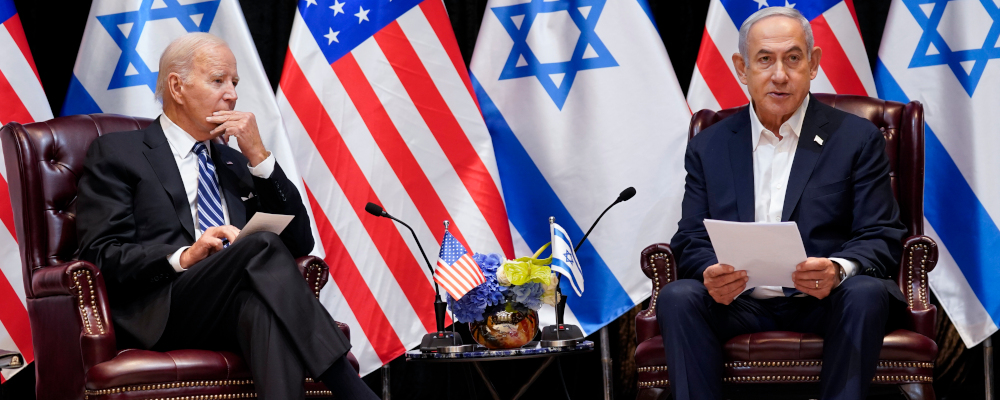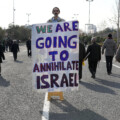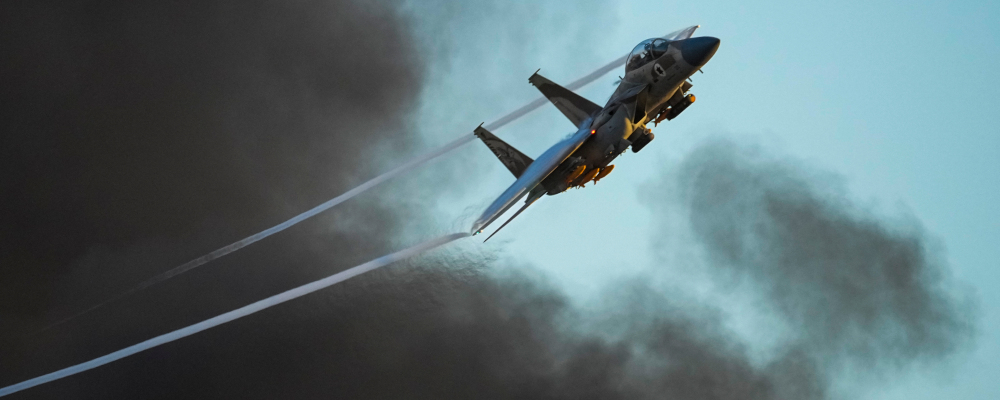Following Israel’s April 18 limited strike on Isfahan, British Prime Minister Rishi Sunak asked that “calm heads” prevail and that all parties avoid “significant escalation.” Israel’s action is in fact the best way to avoid further escalation and restore the deterrence of Iranian attacks on Israel that prevents it.
The war in Gaza is as much about Iran’s regional ambitions as about the plight of the Palestinians. Tehran’s pursuit of regional hegemony in recent years, including its nuclear program, has stimulated closer relations between Israel and a growing number of Arab states with a shared interest in containing Iran. The 2020 Abraham Accords and subsequent discreet Arab-Israeli security cooperation recognized this. But two parties were threatened, Iran and the Palestinians, who lost the ability to hold regional settlements hostage to their demands.
It was inevitable that Iran and its Palestinian proxy Hamas would try to provoke an Arab-Israeli clash to fracture the incipient coalition. The October 7 attacks, which would not have occurred without Iranian approval, were the result.

For years Israel and Iran have conducted a shadow war in which each would strike at the other through proxies, in third countries, or using means, such as cyberattacks, providing some deniability. That pattern held in the early months of the current conflict. Iran’s proxies, Hezbollah in Lebanon and Yemen’s Houthis, conducted attacks on shipping in the Red Sea and the Gulf of Aden and daily rocket strikes on Northern Israel. Israel struck Hezbollah targets in Lebanon and Iranian supply lines in Syria, and, on April 1, at architects of October 7 who were in the Iranian consulate in Damascus. The last gave Tehran the pretext for a direct attack on Israel.
Mishandling of Israeli-U.S. relations on both sides had strengthened the temptation for Iran to escalate. Prime Minister Netanyahu had unwisely drawn attention to disagreements with Washington which more deft diplomacy would have minimized, not least by cancelling and then restoring a planned visit by Israeli officials to Washington. President Biden’s repeated calls for Israeli “restraint” in Gaza, unwisely made in public, reinforced the impression of daylight between Israel and the U.S.
That Israel foolishly struck Damascus without informing the U.S., despite the danger of subsequent retaliation against U.S. forces, and that the U.S. made this public, further magnified the apparent gap.
Finally, Biden’s warnings to Tehran not to attack Israel pledged help in Israel’s defence but stopped short of threatening American cooperation in any retaliatory action. Tehran could now risk an attack on Israel without fear of U.S. reprisals.
Of course, Iran took steps to reduce the consequences of its attack. It was telegraphed in advance, enabling Israeli air defences, with assistance from traditional allies and discreet cooperation with Arab states, to down almost all Iranian drones and missiles with minimal damage to Israel.
Attention was diverted from Gaza, where the unavoidable civilian casualties, cynically exploited by Hamas, had turned much international opinion against Israel. But Iran was now diplomatically isolated and the coalition against it was visibly stronger. Biden’s advice to Netanyahu to “take this win” and not retaliate and risk further escalation was not groundless.

There were grounds for seeing the Iranian attack as “symbolic” or “performative.” And Iran has engaged in “symbolic” retaliation before, responding to the 2020 U.S. assassination of an Iranian general with a retaliatory strike on U.S. forces that killed nobody. Many military actions are symbolic in the sense that they convey a political message to the enemy or to third parties. But part of the symbolism of Iran’s attack is that it set a precedent of direct attack on Israeli soil.
Iran could have attacked from Lebanon with Hezbollah’s rockets, with shorter flight times, and against which air defences would have been less effective. But that would not have made the essential political point.
So far, Iran has enjoyed immunity from direct Israeli retaliation as long as it refrained from direct attack itself. Extending that immunity from retaliation to direct attack below a certain threshold, would in itself be a substantial escalation. Tehran’s public statements after the attack that it saw the matter as “concluded” were also intended to discourage Israeli retaliation and generate international opposition to it.
Unwisely public, pressure on Israel from its allies and others to do nothing could only encourage Tehran to think that calibrated attacks could continue, with international pressure preventing Israeli reprisals. Successful pressure along these lines would not be unprecedented. During the Gulf War, President George H.W. Bush persuaded Israel not to retaliate against Iraqi Scud attacks lest this fracture the coalition for repelling Saddam Hussein’s invasion of Kuwait.
But it is unclear whether Iran would necessarily calculate correctly. The success of air defences on April 13 was unprecedented, and even a marginal reduction in their effectiveness would have entailed substantial loss of Israeli lives. Accepting the possibility of a repetition that might be more destructive was inevitably unacceptable to Israel.
So, Israeli retaliation was not just permissible but necessary. That the attack on Isfahan was limited mattered, with Tehran given little provocation to respond. Moreover, limited retaliation avoided playing into Tehran’s hands by creating tensions within the anti-Iran coalition, a coalition of increasing significance to Israeli security. But Israel’s restoration of deterrence against direct Iranian attack actually limits the current conflict. Iran’s pursuit of regional hegemony and its proximity to a useable nuclear capability means that a military reckoning with Tehran may be inevitable. But Israel has probably managed to defer that to a more propitious moment.
Recommended for You

David Polansky: Kind, tolerant Canada is failing the antisemitism test

‘Sometimes there are necessary wars’: David Frum on what the Israel-Iran conflict means for the Middle East and America

‘I want images of burning’: The Full Press on how bias infects protest coverage

‘It will take time’: Vina Nadjibulla on Canada-India relations ahead of Carney’s meeting with Modi



